Books
Eating Animals
Categories: Food
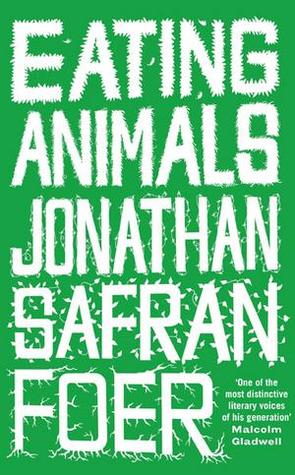
“Ironically, the utterly unselective omnivore — “I’m easy; I’ll eat anything” — can appear more socially sensitive than the individual who tries to eat in a way that is good for society.”
“Isn’t it strange how upset people get about a few dozen baseball players taking growth hormones, when we’re doing what were doing to our food animals and feeding them to our children?”
“If we were to one day encounter a form of life more powerful and intelligent than our own, and it regarded us as we regard fish, what would be our argument against being eaten?”
Foer is better known for his novels-turned-movies Everything is Illuminated and Extremely Loud and Incredibly Close. This book is part memoir, part investigative journalism, diving deeply into the scientific, cultural, moral, and philosophical questions raised when we eat animals.
Everything I Want To Do Is Illegal
Categories: Food
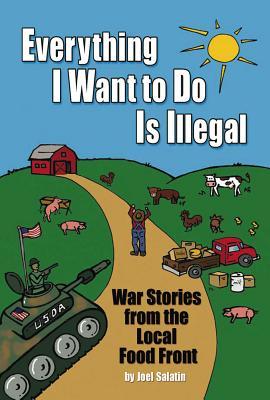
“How much evil throughout history could have been avoided had people exercised their moral acuity with convictional courage and said to the powers that be, ‘No, I will not. This is wrong, and I don’t care if you fire me, shoot me, pass me over for promotion, or call my mother, I will not participate in this unsavory activity.’ Wouldn’t world history be rewritten if just a few people had actually acted like individual free agents rather than mindless lemmings?”
“A farm includes the passion of the farmer’s heart, the interest of the farm’s customers, the biological activity in the soil, the pleasantness of the air about the farm — it’s everything touching, emanating from, and supplying that piece of landscape. A farm is virtually a living organism.”
Salatin, featured prominently in Pollan’s The Omnivore’s Dilemma is an organic farmer using innovative techniques to raise animals more sustainably. He is well-known as one of the leading figures in the world of sustainable food production.
Fast Food Nation
Categories: Food
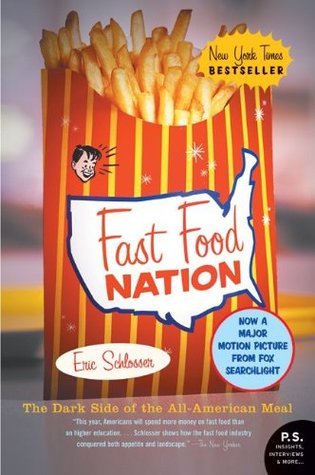
The first and most thorough exposé of America’s fast food industry, touching on health, the environment, corporate greed, and the evolution of consumerism.
“The history of the twentieth century was dominated by the struggle against totalitarian systems of state power. The twenty-first will no doubt be marked by a struggle to curtail excessive corporate power.”
The Revolution Will Not Be Microwaved
Categories: Food
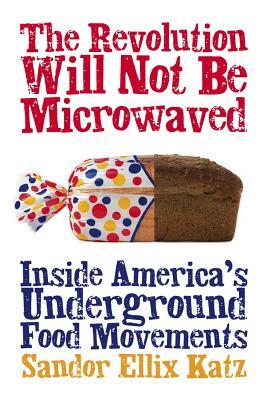
“Laws dictating food standards are driven by the model of mass production, where sterility and uniformity are everything, rendering much of the trade in local food technically illegal. Eating well has become an act of civil disobedience.”
Katz profiles small-scale underground food producers who are challenging processed and industrial food on their own terms.
The One-Straw Revolution
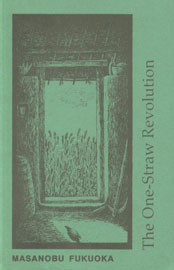
“Human beings are the only animals who have to work, and I think that is the most ridiculous thing in the world. Other animals make their livings by living, but people work like crazy, thinking that they have to in order to stay alive. The bigger the job, the greater the challenge, the more wonderful they think it is. It would be good to give up that way of thinking and live an easy, comfortable life with plenty of free time. I think that the way animals live in the tropics, stepping outside in the morning and evening to see if there is something to eat, and taking a long nap in the afternoon, must be a wonderful life. For human beings, a life of such simplicity would be possible if one worked to produce directly his daily necessities. In such a life, work is not work as people generally think of it, but simply doing what needs to be done.”
“When it is understood that one loses joy and happiness in the attempt to possess them, the essence of natural farming will be realized. The ultimate goal of farming is not the growing of crops, but the cultivation and perfection of human beings.”
Fukuoka is hailed across the world as a master in organic agriculture. His methods of “do-nothing farming” have inspired many, and his questions undermine all assumptions about what it takes to feed ourselves in the industrial age. Part Zen treatise, part memoir, part farming guide, this book is a classic, and a must-read for anybody who grows their own food (which should be everybody).
The Unsettling of America
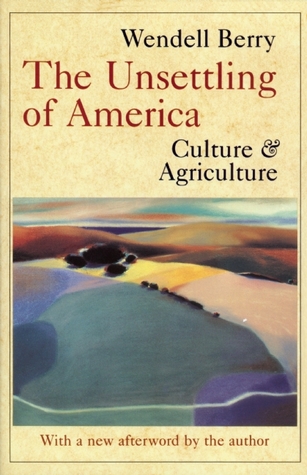
“We have given up the understanding — dropped it out of our language and so out of our thought — that we and our country create one another, depend on one another, are literally part of one another; that our land passes in and out of our bodies just as our bodies pass in and out of our land; that as we and our land are part of one another, so all who are living as neighbors here, human and plant and animal, are part of one another, and so cannot possibly flourish alone; that, therefore, our culture must be our response to our place, our culture and our place are images of each other and inseparable from each other, and so neither can be better than they other.”
Wendell Berry is a farmer and poet, outraged at what is happening with the spread of industrial agriculture. He details how our connection to the land is the definition of our culture, and how our industrial culture is killing both itself and the planet. If you read just one book about food, this should be it. Written over 50 years ago, Berry’s insight is still urgent and could have been written yesterday.
The Omnivore’s Dilemma
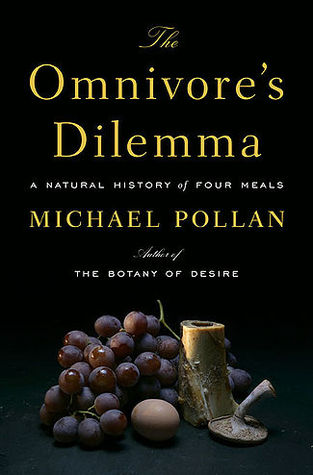
“Imagine if we had a food system that actually produced wholesome food. Imagine if it produced that food in a way that restored the land. Imagine if we could eat every meal knowing these few simple things: What it is we’re eating. Where it came from. How it found its way to our table. And what it really cost.”
This is our modern classic book on the food we eat. Pollan picks apart America’s food system, examining the true impact of industrial agriculture (focusing on corn), what large and small-scale organic farming looks like, and asking if any real alternatives exist. It’s fun, it’s accessible, and it’s deep.
Articles
Frances Moore Lappé changed how we eat. She wants to do the same for our democracy.
Frances Moore Lappé’s book, Diet For a Small Planet, is responsible for popularizing the concept that eating vegetarian is good for the world in ways beyond its impacts on animal welfare. Now, she’s encouraging us to think deeply again, and this time it’s broader and deeper than food.
Read the full article
Save Our Food. Free the Seed.
“The seeds in my palm optimized the farm for large-scale machinery and chemical regimens; they reduced the need for labor; they elbowed out the competition (formally known as biodiversity). In other words, seeds are a blueprint for how we eat.”
“According to a report published by the Organic Seed Alliance, most large-scale organic crop acreage is planted with conventional seed. Despite a recent uptick in the production of organic seed, there isn’t enough to go around. “Not if you want to plant 200 acres,” one midsize organic farmer told me. “Not even if you want to plant 50 acres.”
Farmers find themselves hobbled by weak plants that were designed to be weaned on chemicals.”
Read the full article
Corn Tastes Better On The Honor System
Robin Wall Kimmerer lays out the history of corn as an illustration of our relationship with the Earth and the way we live.
“My handful of Red Lake flint corn seeds were a gift from heritage seed savers, my friends at the Onondaga Nation farm, a few hills away. This variety is so old that it accompanied our Potawatomi people on the great migration from the East Coast to the Great Lakes. If you could carry only a single pouch of seeds, this would be the one to choose, with nutrition for physical health and teachings for spiritual health. Holding the seeds in the palm of my hand, I feel the memory of trust in the seed to care for the people, if we care for the seed. These kernels are a tangible link to history and identity and cultural continuity in the face of all the forces that sought to erase them. I sing to them before putting them into the soil and offer a prayer. The women who gave me these seeds make it a practice that every single seed in their care is touched by human hands. In harvesting, shelling, sorting, each one feels the tender regard of its partner, the human.
My neighbor bought his seeds from the distributor. They are a new GMO variety that he can’t save and replant but must buy every year. Unlike my seeds of many colors, his are uniform gold. They will be sown with the scent of diesel and the song of grinding gears. I suspect that those seeds have never been touched by a human, but only handled by machines. Nonetheless, when the seeds are in the ground and the gentle spring rain starts to fall, I suspect he looks up at the sky and prays. We both stand back and watch the miracle unfold.”
Listen to Robin Wall Kimmerer reading this article:
Read the full article
China’s Dirty Secret: The Boom Poisoned Its Soil and Crops
“Pollution remains a highly sensitive subject in the district. Most interviewees were too frightened to give their names, worried about how local officials might react. Others complained that official secrecy about pollution meant that they could not discover what dangers Zhoutie’s toxic legacy might pose to their own health and that of their families. Zhang Junwei recalled that, when the pollution was at its worst, even people’s sweat was discolored. “Several of my relatives died from cancer very young,” he said.”
Read the full article
Films
How Can We Eat Our Landscapes?
A story of transforming a small town by transforming the landscape that people live in.
One Seed At A Time, Protecting The Future Of Food
How I Fell In Love With A Fish
Chef Dan Barber takes us into his search for an answer to a big question: in an era of fishery collapse, how can he serve fish on his menu without causing harm to the world. His journey to Spain is inspiring, going beyond the question of sustainable fisheries and into our basic assumptions about food production and our relationship with the natural world.
A Guerilla Gardener in South Central LA
Ron Finley—self-proclaimed food gangsta—seeks to transform food deserts and urban poverty through gardens in public places.
“Growing your own food is like printing your own money.”
SEED: The Untold Story
“We lost 94 percent of our vegetable seed varieties in the 20th century,” the film informs the viewer. This visually stunning film chronicles the movement to protect seeds—a practice called “seed saving”—before many disappear forever. Warning of the grave danger seeds are in, this film urges the viewer to recognize our irreparable destruction of ancient seeds, the vulnerability of seeds, and forces them to acknowledge what’s at stake for the future of mankind.
Food, Inc.
Categories: Food
In the modern world, many people are distant from their food sources. What does this actually mean for our world though? Who pays the price for cheap, standardized food production? What does this do to our culture? Food, Inc. chronicles the history of agricultural practices in the US, highlighting the corruption and “high efficiency” industrialization of food production systems, leaving human health and the state of our land in jeopardy. Ultimately, the film underscores the power of consumers to make changes that turn the tides of food practice in the United States.
Rancher, Farmer, Fisherman
Rancher, Farmer, Fisherman challenges the public’s perception of what conservationists look like in America, inserting images of cowboys, ranchers, and fishermen living along the Mississippi into the conversation. Based on the book by Miriam Horn, the film is described as a moving tale that chronicles “conservation heroes who are feeding the world while stewarding the land and water.” The film embeds conservation within America’s heartland, simultaneously highlighting the largely forgotten heroes of the movement who push for sustainable practices in their everyday tasks.
The Memory of Fish
This film introduces the viewer to Dick Goin, a vibrant aging man with a deep reverence for the Elwha River on Washington’s Olympic Peninsula—a body of water that him and his family have personally and professionally relied on since the 1930s. With the river’s salmon population steadily decreasing due to damming, Goin fights to bring back the salmon. Ultimately, The Memory of Fish demonstrates the direct threat being placed on individuals as a result of widespread habitat destruction that stems from modern policy as Goin aims to bring life back to the river that has, in many ways, sustained his own life.






